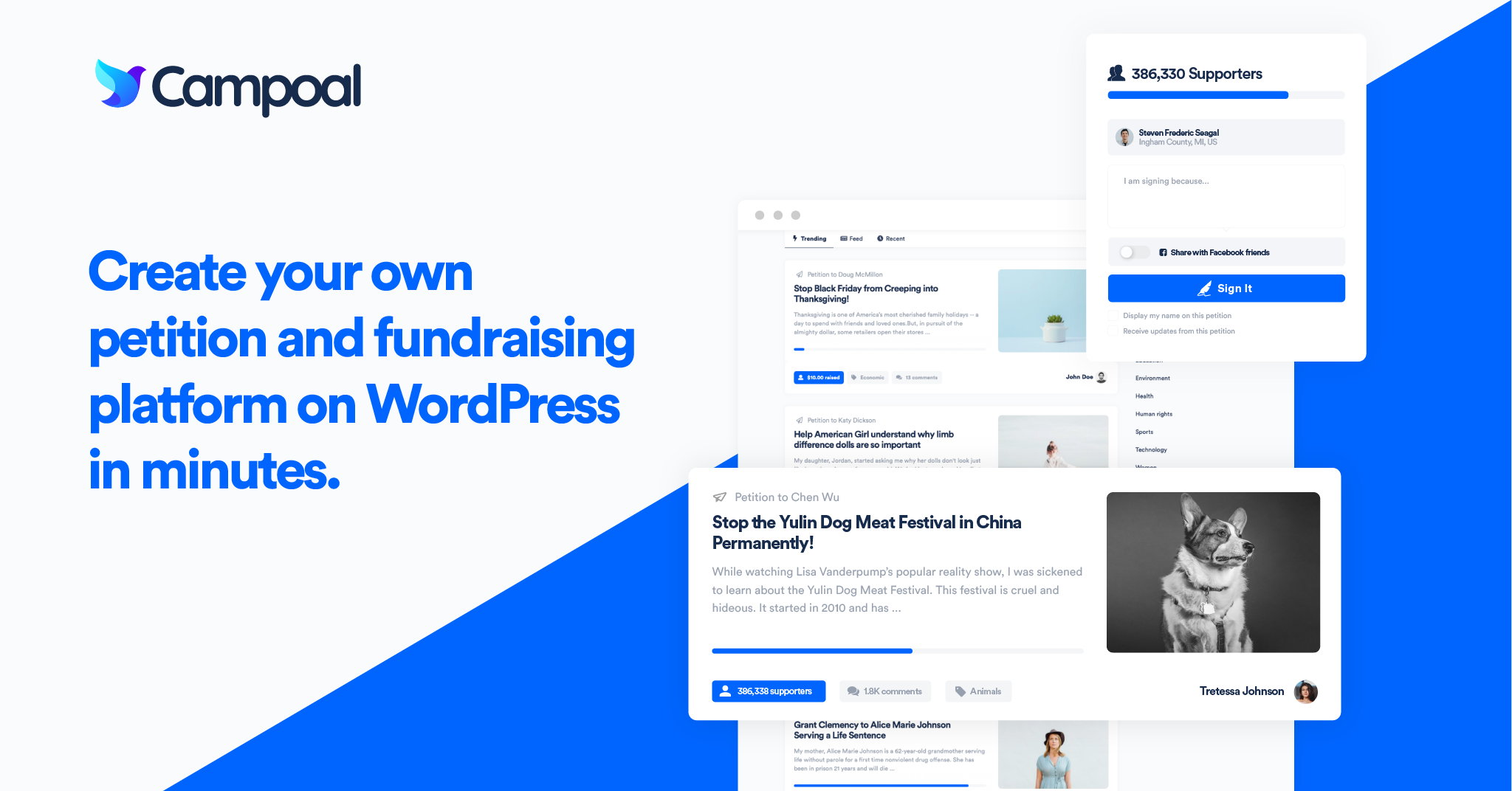In recent years, online petitions have become a popular tool for advocacy and social change. With just a few clicks, anyone can start an online petition and gather signatures from people all over the world. However, despite their popularity, online petitions have been criticized for their effectiveness in creating real change. In this article, we will explore the reasons why online petitions may not work and discuss how organizations can address these limitations to create meaningful change. Additionally, we will introduce Campoal, a social movement WordPress theme that can help organizations create a comprehensive advocacy strategy that includes a range of tactics and channels for engaging decision-makers and stakeholders. By addressing the limitations of online petitions and using tools like Campoal, organizations can create meaningful change and make a difference on the issues that matter most.

Online petitions have become a popular way for individuals and groups to advocate for social change and raise awareness on important issues. However, despite their widespread use, online petitions are not always effective in achieving their intended goals. In this article, we will explore some of the reasons why online petitions may not work and how Campoal, a Social Movement WordPress theme, can help address some of these limitations.
Lack of Accountability
One of the main reasons why online petitions may not work is that decision-makers are not held accountable for their response or lack thereof. While a petition may receive thousands of signatures, decision-makers may not take action on the issue or provide a meaningful response.
Solution: To address this limitation, some organizations have started using online petitions as part of a broader advocacy strategy that includes offline actions such as protests, rallies, and meetings with decision-makers. By combining online and offline tactics, organizations can create a more comprehensive advocacy strategy that holds decision-makers accountable for their actions.
Limited Scope
Another reason why online petitions may not work is that they have a limited scope. Online petitions may be effective in raising awareness and mobilizing support among a specific group of people, but they may not reach decision-makers or stakeholders who have the power to create meaningful change.
Solution: To address this limitation, online petitions should be part of a broader advocacy strategy that includes engaging decision-makers and stakeholders through other channels such as email campaigns, phone calls, and meetings. By expanding the scope of their advocacy efforts, organizations can create a more comprehensive strategy that has a greater chance of success.
Lack of Long-Term Planning
Finally, online petitions may not work because they lack a long-term plan for achieving change. While a petition may achieve its immediate goal, it may not lead to lasting change or address the root causes of the issue.
Solution: To address this limitation, organizations should have a long-term plan for achieving their advocacy goals. This plan should include clear objectives, a timeline for achieving those objectives, and strategies for measuring progress and adjusting tactics as needed.
Lack of Credibility
Another reason why online petitions may not work is the lack of credibility associated with them. Decision-makers and stakeholders may not take online petitions seriously, viewing them as merely a way for individuals to express their opinions without any real commitment to the cause.
Solution: To address this limitation, online petitions should be backed by credible organizations and individuals with a track record of advocacy and social change. Organizations should also provide evidence-based arguments and solutions that demonstrate the seriousness of the issue and the potential impact of the petition.
Over-Saturation of Online Petitions
Online petitions have become so popular that decision-makers and stakeholders are inundated with them on a daily basis. As a result, online petitions may be viewed as just another form of spam or noise that decision-makers ignore.
Solution: To address this limitation, organizations should be strategic in their use of online petitions and only use them when they are likely to be effective. Online petitions should be part of a broader advocacy strategy that includes a range of tactics and channels for engaging decision-makers and stakeholders.
Lack of Follow-Up
Online petitions may not work if they are not followed up with additional actions or communications. Decision-makers and stakeholders may view the petition as a one-time event rather than a sustained effort to create change.
Solution: To address this limitation, organizations should follow up on their online petitions with additional actions and communications. This may include sending thank-you emails to signatories, providing updates on the status of the issue, and engaging decision-makers and stakeholders through other channels.
Limited Target Audience
Another reason why online petitions may not work is that they may not reach the target audience. Online petitions may be shared widely on social media, but the people who see them may not be the ones who have the power to create change.
Solution: To address this limitation, organizations should identify the decision-makers and stakeholders who have the power to create change and target their advocacy efforts towards them. This may involve using targeted advertising, direct outreach, or other strategies to reach the intended audience.
Lack of Diversity
Online petitions may also lack diversity in terms of the people who sign them. Online petitions may attract a narrow segment of the population, which may limit their effectiveness in creating real change.
Solution: To address this limitation, organizations should ensure that their advocacy efforts are inclusive and reach a diverse range of people. This may involve working with community organizations, reaching out to underrepresented groups, and using inclusive language and messaging.
Ineffective Messaging
Finally, online petitions may not work if the messaging is not effective in motivating people to take action. The messaging may not resonate with the intended audience or may not effectively communicate the urgency and importance of the issue.
Solution: To address this limitation, organizations should invest time and resources into crafting effective messaging that resonates with their intended audience. This may involve conducting research, testing messaging, and working with communication professionals to develop compelling messages.
Lack of Specificity
Online petitions may also lack specificity in their demands, which can make it difficult for decision-makers and stakeholders to know what specific action to take.
Solution: To address this limitation, organizations should be specific about their demands in their online petitions. They should clearly articulate what they want decision-makers to do and provide specific recommendations for how they can achieve the desired outcome. Providing clear and specific demands can increase the likelihood that decision-makers and stakeholders will take action.
In conclusion, while online petitions can be a valuable tool for advocacy and social change, they are not a silver bullet. To make online petitions more effective, organizations should address these limitations by creating a comprehensive advocacy strategy, backed by credible individuals and organizations, with a long-term plan for achieving change. By doing so, organizations can create meaningful change and make a difference on the issues that matter most.
How Campoal solve the problem?
Campoal is a social movement WordPress theme that can help organizations address some of the limitations of online petitions. The theme is designed to help organizations create a comprehensive advocacy strategy that includes a range of tactics and channels for engaging decision-makers and stakeholders.

With Campoal, organizations can create a website that highlights their cause and provides information about their advocacy efforts. The theme includes features such as a donation system, event calendar, and social media integration, making it easy for organizations to engage their supporters and build a community around their cause.
One of the key features of Campoal is its focus on credibility. The theme is designed to help organizations build credibility by showcasing their achievements, highlighting their partnerships, and featuring testimonials from supporters. By building credibility, organizations can increase the likelihood that decision-makers and stakeholders will take their online petitions seriously.
Another key feature of Campoal is its focus on inclusivity and diversity. The theme is designed to be accessible and inclusive, with features such as multilingual support and a responsive design that works on all devices. This can help organizations reach a wider audience and ensure that their online petitions are signed by a diverse range of people.
Finally, Campoal can help organizations create effective messaging that resonates with their intended audience. The theme includes customizable templates and layouts that can be tailored to the specific needs of each organization. This can help organizations create compelling messages that effectively communicate the urgency and importance of their cause.
In conclusion, Campoal can help organizations address the limitations of online petitions by providing a comprehensive advocacy strategy that includes a range of tactics and channels for engaging decision-makers and stakeholders. With its focus on credibility, inclusivity, and effective messaging, Campoal can help organizations create meaningful change and make a difference on the issues that matter most.

Campoal - No.1 Petition & Fundraising WordPress Theme
Campoal is a perfect WordPress theme to create the petition platform with fundraising. Where anyone can be start a social movement, collect supporters and raise funds to change something in society.
Related Articles

The best way to create an online petition website

